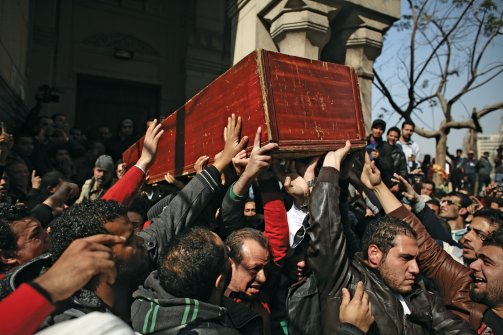 Mohamed al-Gendy, a popular activist, was last seen alive at around 2:30 a.m. January 28, when he said good night to a journalist friend near Cairo’s Tahrir Square and headed home. When Gendy didn’t show up at a planned march the next day, his cellphone switched off, his friends grew alarmed—especially because he had recently received threatening texts, telling him to stop his activism.
Mohamed al-Gendy, a popular activist, was last seen alive at around 2:30 a.m. January 28, when he said good night to a journalist friend near Cairo’s Tahrir Square and headed home. When Gendy didn’t show up at a planned march the next day, his cellphone switched off, his friends grew alarmed—especially because he had recently received threatening texts, telling him to stop his activism.
Gendy, 30, was an organizer with the opposition movement the Popular Current and a multilingual tourism guide whose Facebook page was filled with photos of him grinning on trips to Paris and New York. Gendy, who liked arranging for food at sit-ins, was beloved by friends, who remember him as a kind, generous man. When Ihab Ghobashy, a close friend, lost his job, Gendy discreetly paid his rent.
Ghobashy looked all over Cairo for his friend, searching police stations and hospitals without luck. The only trace of Gendy he found was at the Red Mountain police camp on the city’s outskirts. A training facility for the riot police, in the past it had been used to house detainees during the reign of dictator Hosni Mubarak. Though it wasn’t an official prison, during the days of unrest surrounding Gendy’s disappearance, it suddenly swelled with political prisoners again.
Demonstrators, to honor the two-year anniversary of their revolution against Mubarak, were now massing in protest of President Mohamed Morsi and the Muslim Brotherhood (the Islamist group that backs him), accusing the government of overreach. At the same time, three cities in the Suez burst into unrest, leading Morsi to declare a state of emergency in the region. Speaking darkly of “counterrevolution,” Morsi warned in a seething speech January 27: “If I see that the homeland and its children are in danger, I will be forced to do more than that.”
Three days later, Ghobashy and a few friends approached the Red Mountain camp with a photo of Gendy, which they showed to a handful of teenage boys who had just been released. The boys, Ghobashy and his friends say, recognized the photo and said Gendy was still inside the camp, badly beaten. The next day, Gendy’s friends staged a protest demanding his release.
Ghobashy was at the Popular Current offices in Cairo when he received a call from a friend who said Gendy had been found at Helal Hospital in central Cairo. Rushing there, he found Gendy in a coma in the intensive care unit. He had a brain hemorrhage, fractured ribs, and a badly battered face. Within the week, Gendy was dead.
Ghobashy and his friends say they had already searched for Gendy at Helal in the first few days after he disappeared. But according to the hospital, Gendy was there all along—admitted in the early hours of January 28, the victim of a hit-and-run. As proof, the hospital provided a patient entry log, which was obtained by Newsweek. On it, Gendy’s national ID number is listed alongside the entry for a 16-year-old boy, also named Mohamed, but with a different family name.
Certain that hospital officials were covering up police abuse, opposition activists began to draw parallels between Gendy and Khaled Said, the Alexandria man whom police beat to death in 2010, sparking the revolution. Soon, Gendy’s bespectacled likeness appeared in graffiti portraits on walls around Cairo.
Police abuse defined the Mubarak era. Defending itself against charges of excessive force, Morsi’s government claims that such methods are a holdover from the past—and that the Interior Ministry is resistant to change.
Gendy’s death, however, has been hard to explain away amid mounting public pressure. Before the release of the autopsy report, Morsi’s Justice minister assured the public that Gendy had indeed been killed in a hit-and-run, leading activists to suspect a cover-up reaching into Morsi’s government. When the autopsy report was released days later, sticking to the hit-and-run verdict, they saw it as part of the lie—in 2010 authorities had likewise issued a contested medical report claiming that Said had choked to death on a bag of marijuana.
In the ensuing uproar, Egypt’s general prosecutor ordered another medical review, which a panel of three doctors completed earlier this month. “We rule out the possibility” of a hit-and-run, said the review, a copy of which was obtained by Newsweek. Gendy likely died “by being beaten violently,” the report says. The doctors leave the door open for investigators to determine “if the death was a result of torture or not.”



